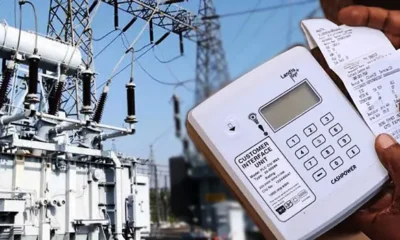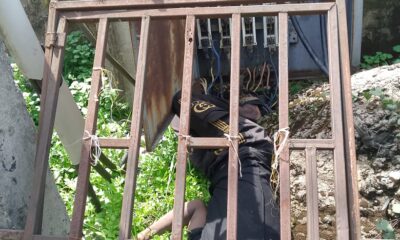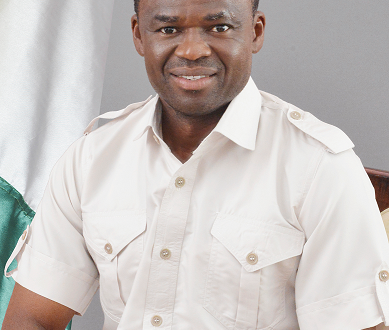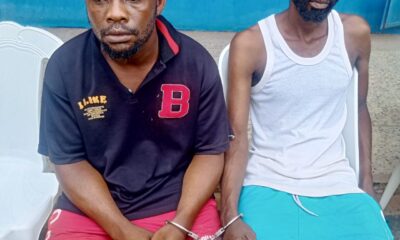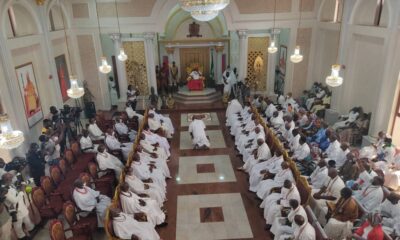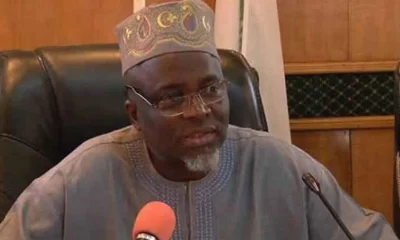Headline
New Electricity Tariff: Full List Of Eko Electric 21 Band A Areas
Published
4 weeks agoon
By
Editor
The Nigerian Electricity Regulatory Commission, on Wednesday, approved a sharp increase in electricity tariffs for customers classified under Band A. Some customers of Eko Electricity Distribution Company, EKDC, will be affected by the new electricity tariff.
Customers in this category will now be charged N225 per kilowatt-hour (KW/h). It is a significant rise from the previous rate of N66 electricity tariff.
The new rate takes effect from 3rd April 2024.
This was revealed by Musliu Oseni, the Vice Chairman of NERC. You can read the full list of Band A electricity tariff areas across the country HERE.
Wrongly bill?
Meanwhile, the regulator has directed all Electricity Distribution Companies, DisCos, to provide as much clarity as possible to all affected customers.
For instance, on the new electricity tariff, NERC said: “All customers wrongly billed at the new rate should be refunded through energy tokens no later than Thursday the 11th of April 2024.
READ ALSO: Electricity Tariff: Simple Guide To Check If You’re On Band A, B, C, D or E
“And (they should) file evidence of compliance with the Commission by the 12th of April 2024.”
Band A
Below are the 21 Band A areas of Eko Electricity Distribution Company affected by the new tariff:
1. IJORA T/S_AJELE 1_AJELE_NEPA 1 ISLAND CAMPOS STREET BROAD STREET INNER MARINA STREET
2. ALAGBON T/S_ADEMOLA 2_ADEMOLA_POSTE RMU ISLAND ADEMOLA ADETOKUNBO STREET SANUSI FAFUNWA STREET/IDOWU TAYLOR STREET AKIN ADESOLA STREET/ADEOLA ODEKU STREET
3. IJORA T/S_AJELE 2_AJELE_CSS ISLAND AJELE STREET BROAD STREET/CUSTOM STREET INNER MARINA STREET/MARTINS STREET
4. IJORA T/S_AJELE 2_AJELE_NEW CUSTOMS ISLAND CAMPBELL STREET BAMGBOSHE STREET KING STREET
5. ALAGBON T/S_FOWLER 3_FOWLER_STATION FEEDER ISLAND OLUWA ROAD/THOMPSON AVENUE GLOVER ROAD/LAWRENCE ROAD/ALFRED REWANE ROAD MOSELEY ROAD/AWOLOWO ROAD
READ ALSO: Why We Hiked Electricity Tariff – FG
6. ALAGBON T/S_FOWLER 1_FOWLER_IKOYI HOTEL ISLAND OLUWA ROAD ALFRED REWANE ROAD IKOYI HOTEL/ALFRED REWANE ROAD
7. IJORA T/S_AJELE 1_AJELE_NEPA 2 ISLAND AJELE STREET BROAD STREET KAKAWA STREET/ABIBU OKI STREET
8. ALAGBON T/S_ADEMOLA 2_ADEMOLA_NTDA ISLAND ADEMOLA ADETOKUNBO STREET SANUSI FAFUNWA STREET AKIN ADESOLA STREET/AMODU TIJANI CLOSE
9. ALAGBON T/S_ADEMOLA 2_NEPA CLOSE_DOVER ISLAND NEPA CLOSE AHMADU BELLO WAY SAKA TINUBU STREET
10. ALAGBON T/S_ADEMOLA 2_NEPA CLOSE_STANDARD CHARTERED BANK ISLAND NEPA CLOSE AHMADU BELLO WAY AHMADU BELLO WAY
11. ALAGBON T/S_FOWLER 1_FOWLER_KINGSWAY ISLAND OLUWA ROAD/ALFRED REWANE ROAD OLU HOLLOWAY ROAD/THOMPSON AVENUE LUGARD AVENUE/CAMERON ROAD
12. ALAGBON T/S_ALAGBON LOCAL_ALAGBON LOCAL_MOBOLAJI JOHNSON ISLAND OSBORNE ROAD MOBOLAJI JOHNSON ROAD OLU HOLLOWAY ROAD/BAYO KUKU ROAD/CAMERON ROAD
13. ALAGBON T/S_FOWLER 3_FOWLER_MULLINER TOWER ISLAND OLUWA ROAD ALFRED REWANE ROAD MULLINER TOWER
READ ALSO: FG Raises Electricity Tariff For Customers Enjoying 20-hour Power Supply
14. LEKKI T/S_ONIRU_WATERFRONT_TWIN WATER LEKKI REMI OLOWUDE STREET BOSUN ADEKOYA STREET OKUNADE BLUEWATERS SCHEME
15. LEKKI T/S_LEKKI_LEKKI_WOLE OLATEJU LEKKI ADMIRALTY WAY ADMIRALTY WAY WOLE OLATEJU/WOLE ARIYO
16. LEKKI T/S_WATER FRONT_LEKKI_PRIME WATER VIEW LEKKI UTOMI AIRIE AVENUE FREEDOM WAY OJULARI ROAD
17. LEKKI T/S_LEKKI_LEKKI_BASHORUN OKUSANYA LEKKI EMEKA NWEZE STREET BASHORUN OKUSANYA STREET/ADMIRALTY RD OGIDI CRESCENT
18. LEKKI T/S_ONIRU_WATERFRONT_PROVIDENCE LEKKI REMI OLOWUDE STREET ADEWUNMI ADEBIMPE ROAD EMMANUEL ADEBAYO CLOSE/OMORINRE JOHNSON STREET
19. LEKKI T/S_LEKKI_LEKKI_WATER CORPORATION LEKKI UTOMI AIRIE AVENUE MUHAMMED MARWA WAY HUNPONU WUSU ROAD/ENGR. GEORGE ENENMOH CRES
20. LEKKI T/S_AGUNGI_AGUNGI_OSAPA LEKKI MUFUTAU ELETU ROAD MURITALA ELETU WAY AGUNGI/AIRAN ROAD
21. AKANGBA T/S_SANYA_SANYA_TEXLON ORILE APAPA – OSHODI EXPRESS WAY OGUNGBESAN STREET OGUNGBESAN STREET
You may like


Suspend Implementation Of New Electricity Tariff, Reps Tell NERC


Lawyer Drags NERC, AGF, Minister Of Power To Court Over Electricity Tariff Hike


Poor Power Supply: FG To Unbundle 11 Discos, Orders Sale Of Four


Customer Drags NERC, AGF To Court Over Electricity Tariff Hike, Classification


Transformer Vandal Met Waterloo, Electrocuted In Benin


Electricity Tariff: How To Check If You’re On Band A, B, C, D Or E
Headline
PICTORIAL: C&S Church Ayo Ni O Installs New Leader
Published
5 hours agoon
May 2, 2024By
Editor
The Cherubim and Seraphim (S&S) Movement Church Worldwide, on Wednesday, formally installed Prophet Emmanuel Alogbo as the 6th Baba Aladura and spiritual head of the church.
Alogbo was appointed the acting spiritual head in November 2023 following the death of his predecessor, Samuel Abidoye, who died on November 12, at the age of 103.
A statement published on the official website of the church reads, “The ascension of Most Senior Special Prophet Dr. Emmanuel Abiodun Alogbo to the revered position of Spiritual Father and Chairman of the Cherubim and Seraphim Movement Church signifies a pivotal moment in the history of the church, ushering in a new era of leadership and guidance for its global congregation.”
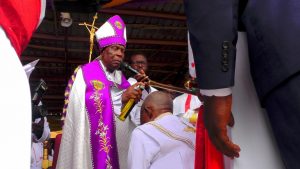
READ ALSO: Officer Who Shot Man Dead During Fuel Queue Tumult Identified — Lagos Police
Alogbo’s installation was reported to have been attended by important figures in the church, “including the Olori of Cherubim and Seraphim Unification, His Most Eminence Pro. Dr. S. A. Alao J.Pil., who performed the anointment, which added to the solemnity and grandeur of the occasion.”
Alao was said to have charged the new Baba Aladura to embrace his role with strength and courage.

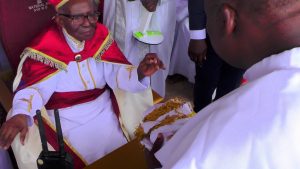
Congregants were also said to have recognised Alogbo as an embodiment of divine wisdom, compassion, and spiritual insight.
In his pledge to the CSMC Worldwide, the new Baba Adura was quoted assaying, “I solemnly pledge to continue the good work of moving our beloved church forward, which the late Baba Aladura Prophet Samuel Adefila Abidoye started.
“It is my firm commitment to ensure that the C&S Movement Church continues to march on, spreading its message of faith and love to all corners of the globe.”
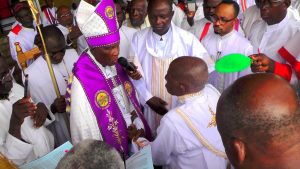
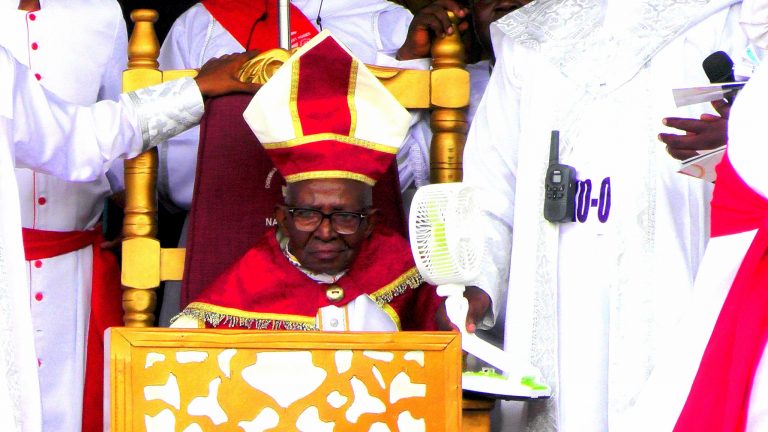
Headline
Nigerian Man Extradited From Malaysia, Convicted For $6.3m Fraud In US
Published
7 hours agoon
May 2, 2024By
Editor
A federal jury in New Haven, Connecticut, Wednesday, convicted an extradited Nigerian national, Okechukwu Osuji, for engaging in a business email compromise scheme out of multiple countries, including the United States.
This was revealed in a statement by the US Department of Justice on Thursday, saying that Osuji and his accomplices, John Wamuigah and Tolulope Bodunde defrauded their victims of over $6.3 million.
The jury convicted Osuji of conspiracy to commit wire fraud, wire fraud, and aggravated identity theft.
Principal Deputy Assistant Attorney General Nicole M. Argentieri, head of the Justice Department’s Criminal Division, said, “Osuji led a network of scammers in Malaysia and elsewhere in a sophisticated business email compromise scheme to defraud victims of millions of dollars.”
READ ALSO: Nigerian Sues Malaysia Govt N406m For Unlawful Detention
“Today’s conviction is another example of how the department’s collaboration with international law enforcement partners enables us to bring cybercriminals to justice in the United States.”
US Attorney Vanessa Roberts Avery for the District of Connecticut added, “While it is often difficult to identify and bring to justice cybercriminals operating overseas, today’s verdict demonstrates the expertise of the FBI and Stamford Police in uncovering this criminal network, and the shared commitment of our counterparts in Malaysia to ensure that fraudsters are held accountable in a court of law.
“We will continue to work to root out those who engage in internet fraud schemes, no matter where in the world they operate, and achieve justice for victims of these crimes.”
“The defendant perpetrated a complex international business email compromise scheme and laundered millions in stolen proceeds,” said Executive Assistant Director Timothy R. Langan Jr. of the FBI’s Criminal, Cyber, Response, and Services Branch.
READ ALSO: EFCC Arraigns Nigerian Who Posed As Woman To Dupe Malaysian
“This conviction is the result of hard work and close collaboration between the FBI and our local and international partners. Together, we will work aggressively to bring to justice anyone who engages in fraud and theft against Americans, no matter where they are in the world.”
“Today’s verdict provides a bit of closure to some victims of these often financially crippling crimes,” said Special Agent in Charge Robert Fuller of the FBI New Haven Field Office.
“It also displays our international ability to bring criminal actors to justice despite the complexities of their crimes. We want to thank all of our law enforcement partners here and abroad, as well as the U.S. Attorney’s office, for their dedication to serving justice.”
READ ALSO: Naira Abuse: EFCC, Cubana Chief Priest To Settle Out Of Court
Osuji who was deported by Osuji is slated to be sentenced on July 24 and faces a mandatory minimum of two years on the identity theft count and a maximum penalty of 60 years in prison on the wire fraud and conspiracy counts.
A Federal District Court judge will determine any sentence after considering the US Sentencing Guidelines and other statutory factors.
Osuji was arrested in Malaysia and extradited to the US in 2022. His alleged co-conspirator, Wamuigah, remains in Malaysia and is pending extradition proceedings, while another co-conspirator, Bodunde, pleaded guilty on February 16.
Headline
How Two Kenyan School Dropouts Made Prosthetic Arms For People With Disabilities
Published
15 hours agoon
May 2, 2024By
Editor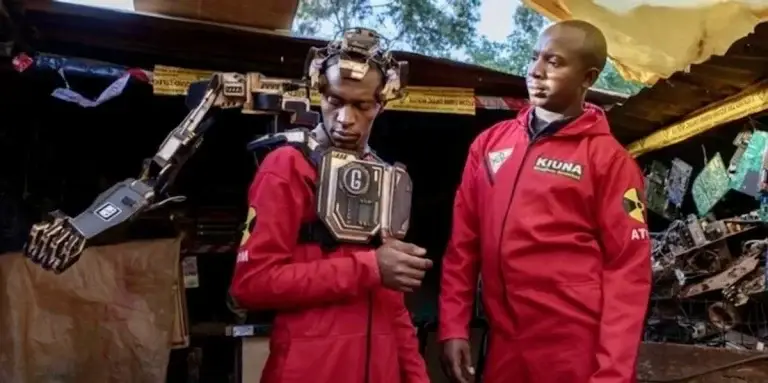
Two young Kenyan inventors have invented bio-robotic prosthetic arms from waste materials to help improve the lives of the physically challenged people in 2021.
Both David Gathu and Moses Kiuna were at the age of 29 when they designed a bio-robotic prosthetic arm in helping the people that have lost their limbs.
Recounting their ordeal before venturing into the invention, the duo said they were forced to drop out of college because of the expensive school fees but did not let the challenges steal their vision.
Gathu and Kiuna accomplished their dream to help their communities in a workshop in Kiambu county in Kikuyu, Kenya, north of the capital Nairobi.
READ ALSO: 14-year-old Boy Killed In London Sword Attack
According to Face to Face Africa, the workshop was basically a shed made out of worn-out rusted iron sheets standing next to a chicken coop.
The floor was covered with gravel, making the ground outside the shop and the interior all but indistinguishable, as brown broken glass with tape all around fits the window frame.
Brain signal bio-robotic arm
Another significant thing about the invention was being the world’s first bio-robotic arm operated by brain signals. The invention, which is controlled by brain signals, has been billed as a game-changer in the lives of disabled people in Kenya.
Gathu and Kinyua’s invention was unique and different from most prosthetic technology which is powered by a person’s muscles.
READ ALSO: Woman Reveals Secret To Longevity As She Celebrates 106th Birthday
The arm works by converting brain signals into an electric current by a “NeuroNode” biopotential headset receiver. NeuroNode biopotential was originally invented to help people suffering from paralysis and speech loss.
Also, the inventors narrated that the idea to develop an electronic prosthetic came to them during the pandemic as part of their contribution towards assisting Kenya to battle the pandemic. It was initially created to help COVID-19 sanitisation efforts.
“When the virus hit our country, we decided to create a machine that could help us decontaminate surfaces. It can also be used in schools, restaurants, hospitals,” Shoppe Black quotes Kinyua as saying.
Using waste products
According to a report by Anadolu Agency, the Kenyan inventors solved two problems with their innovations, first, by using waste products to make the environment clean and safe, and helping a community of people living with disabilities.
READ ALSO: Popular Iraqi TikToker Umm Fahad Gunned Down Outside Baghdad Home
“People throw away a lot of things that are harmful to the environment just because they don’t work. If they don’t work, it might be just one component that’s faulty but all the other components still work and can be recycled,” Gathu said.
“We’ve recycled everything that you see here. They throw it away, we pick it up and use it. This has saved us from spending a lot of money because we’re not backed up financially by anyone to come up with our innovations.”
They picked up “junk” that people threw away – things like plastic, rubber, wiring, old computer motherboards, LED lights, USB devices, switches, optical drives, heat sinks, fans, and power supply units – components that they say could be quite expensive to purchase from a shop.
Helping the community
READ ALSO: UK-based Nigerian Doctor Loses Licences Over Sex For Free Botox Injections
Speaking about the physically challenged people, he said, “The main reason we came up with this is to help people in our community who have lost their limbs. We don’t want these people to feel like they can’t do anything, we want them to be dependent on themselves.”
The arm can do many more tasks. They say they are still perfecting their device, but lack of funds has been a challenge.
David Mathenge from the Association for the Physically Disabled of Kenya (APDK), a charity NGO, says: “Such inventions are the future of the science of artificial limbs. This is the science we need to ease the challenges people with disabilities face.”

PICTORIAL: C&S Church Ayo Ni O Installs New Leader

Court Remands Tenant For Setting Landlord’s House On Fire In Ibadan

Officer Who Shot Man Dead During Fuel Queue Tumult Identified — Lagos Police
Trending

 Politics2 days ago
Politics2 days agoWhy Candidate Who Needs Interpreter Can’t Be Edo Gov – Shaibu

 Metro4 days ago
Metro4 days agoEdo Police Arrest Suspected Cultists Who Allegedly Killed Rival In His Daughter’s Presence

 Business3 days ago
Business3 days agoCustomers Panic As CBN Bans Opay, Palmpay, Others’ New Accounts

 News5 days ago
News5 days agoJUST IN: Popular Gospel Singer Is Dead

 News1 day ago
News1 day agoEx-policeman Who filmed Wife Having Wex With Her Superior Found Guilty Of Stalking

 News3 days ago
News3 days agoOoni: Suspended Benin Palace Functionaries Banished

 News2 days ago
News2 days agoJUST IN: FG Approves Salary Increase For Civil Servants

 News3 days ago
News3 days ago2024 UTME: JAMB Withholds Results Of 64,624 Candidates

 News3 days ago
News3 days agoBREAKING: JAMB Releases 2024 UTME Results

 Metro4 days ago
Metro4 days agoGunmen Assassinate Governor Aiyedatiwa’s Campaign Coordinator In Ondo

